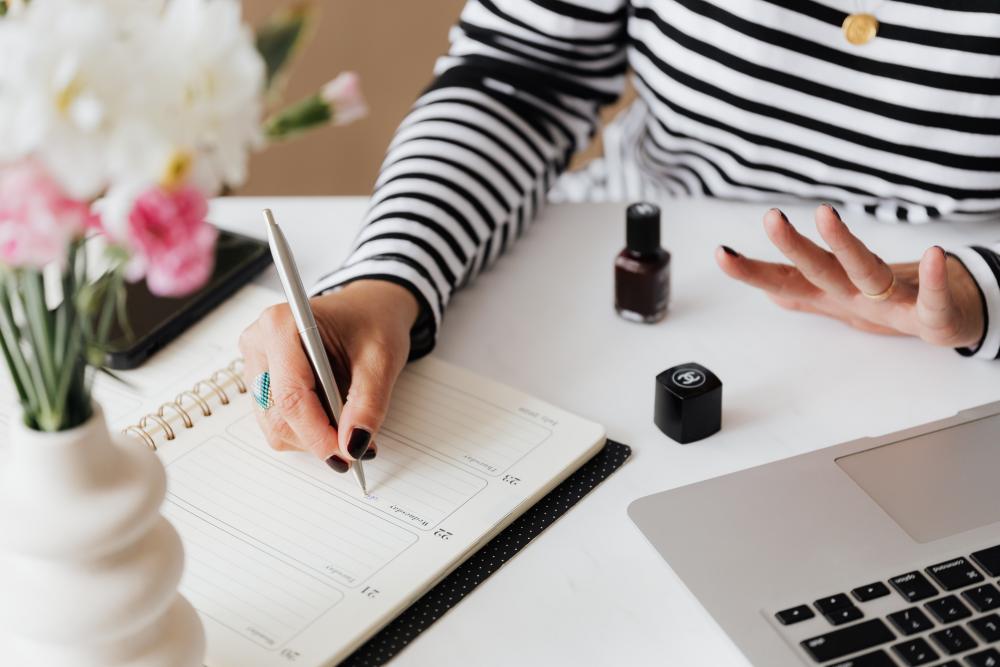As we move towards fall, life just picks up the pace. Kids are back to school and the holidays are coming. I see a common thread running through the lives of clients, friends, and family members alike: an overwhelming task list with not enough time to accomplish it. All the pressure to accomplish more, constantly being tethered to their email, and feeling as if they are living in a constant state of stress. What I’ve come to realize is that by choosing to do just a little bit of planning, most folks are able reduce stress and feelings of overwhelm.
One of the things that exacerbates feeling overwhelmed is that many of us – and yes, I include myself in this at times – passively move through our weeks and just hope they go well. When something unexpected comes up, we just don’t have the emotional bandwidth, let alone time, to deal with it. Or, if we do have to deal with an emergency of sorts that demands our time and attention, something has to give.
The real truth is that even a little planning can go a long way to reduce stress levels.
Because I know that in order to be happier and healthier, it is critical that you find a way to reduce stress in your life. We all know this. Our health care practitioners telling us that stress is killing us as a society. So, how do you find some practical solutions to take back control to consciously move forward in your life?
Because, if there’s something I know for sure, when we are choosing to live consciously, we cannot help but reduce stress in our lives. That’s one of the side effects of conscious living: less daily stress and when the unexpected happens, we can roll with it with more ease.
Frankly, you may not have an hour a week to give. That’s why I’m going to offer a buffet of ideas to help you plan just a little and see how it affects the quality of your daily life.
Here are Eleven Little Ways to Use Planning to Reduce Stress:
One – Write it All Down
Between my bullet journal and calendar (electronic), everything that needs attending to gets written down. Tasks, appointments, grocery lists….write it all down. This process of ensuring that all the swirling thoughts in my head don’t get stuck there always helps.
Research has shown that our brain processes information more effectively when we write it down, so the choice to go old school can’t help but reduce your stress level and help with problem solving.
Two – Look Ahead
Before the work week begins, sit down and look at the week ahead. I tend to do my looking ahead on Friday mornings.
-
- What appointments do you have scheduled? What deadlines? Any family obligations?
- Do you have a day that feels over booked? By looking ahead, you can reduce stress and ensure that you don’t get double booked.
- Do you have a block of time that wonderfully free and you want to ensure it stays that way? Now’s the time make sure nothing gets scheduled.
- Do you have a pending deadline? Looking ahead empowers you to schedule time to work towards that deadline…or on a big dream or goal.
When we know what is ahead of us, we can feel prepared, reduce surprises, and ensure we don’t forget important things we need – and want – to do.
Three – Put It On Your Calendar
It’s easy to slip into a habit of beating yourself up for not getting it all done. I’m talking about things like exercise, lunch date, and other activities that allow us to feel more in control of our days. If you plan ahead for these things by putting it on your calendar – aka making appointments with yourself – you can ensure that those important activities don’t get ignored.
This is why I schedule my workouts to ensure they don’t get pushed aside because I get “too busy”.
Four – Differentiate Between Planning and Execution
Planning is breaking down all the steps to complete a task. Execution is actually completing those tasks.
While I’m a fan of planning, know that you’ll be able to reduce stress by separating your planning time from execution time. Planning and immediately attacking your task list compresses a time crunch. Making this a habit will lead to you living more by the seat of your pants (aka more unconsciously).
Having a detailed plan dramatically cuts down on the amount of time wasted executing tasks. You always know exactly what you need to do next- you won’t have to continually switch between “planning mode” and “doing mode.”
Five – Even a Rough Schedule Helps Reduce Stress
Though I look ahead once a week, every day before I leave my office, I review my schedule for the next day. This allows me to see what has to be done at a specific time and what blocks of time I have available to manage other tasks.
Organizing tasks into a schedule doesn’t have to be overly precise, yet it will reduce stress to know the order in which you plan to tackle them. It also means that your most important – or harder tasks – don’t get pushed to the next day (and the next, and the next…).
I’m a morning person, so I find it’s best to begin with the most important tasks first and work your way down. I have more mental energy to deal with the harder stuff early. If you aren’t a morning person, you may want to set yourself up for success by doing some small tasks to help you gain some momentum.
Six – Do Some Meal Planning
I don’t know of a single person that doesn’t want to eat a healthy diet. One of the biggest challenges to deciding what you’ll be eating when you’re already hungry. It’s the arsenic hour that gets to us at the end of the day: “what’s for dinner?”
You don’t have to overly analyze, but a rough menu for the week helps you not only manage your grocery budget, but reduces stress in your daily life.
If you’ve never been a meal planner, here’s a blog post to help you that includes a downloadable planning form.
Seven – Make Weekend Plans by Thursday
Last minute planning on the weekends wastes time and energy. And even the most go with the flow folks can feel stressed when you start trying to juggle last-minute plans. No, I’m not saying to plan your weekends to the minute, but some concrete plans allows you to take advantage of weekends
Eight – Schedule Down Time
Having a day a week to unplug is a path to feeling less stressed each week. But, I also know that not everyone has the bandwidth to ensure it happens every week. At a bare minimum, choose to reduce stress in your life by scheduling at least one day a month to do exactly what you want…and that includes doing nothing.
I’m a big fan of having some quality alone time. It gives you time to become comfortable with your own company, figure out what you truly love to do, and find a way to honor your own curiosity. Awareness is a powerful thing.
Nine – Commemorate The End of the Week
Perhaps it is a comfort meal or having a date night with your sweetie. Planning a regular ritual that occurs when the work week ends and the weekend begins gives you something to look forward to. It will also be a signal to your mind to transition into a different mode: relaxing. Relaxing will reduce your stress.
Ten – Plan What to Wear
When I traveled all the time for work, I had to plan what to wear so that I could pack it. It forced me to plan, matching blouses to blouses and making sure the jewelry I wanted to wear with each outfit was in my bag. Planning what to wear to work – whether you plan for the coming week or just the next day – can’t help but reduce stress in the mornings.
Working from home means that I no longer plan weekly, but it’s a good skill to have when I travel. I also do wardrobe planning for JB – like matching shirts and ties to suits – when I pick them up from the cleaners. Not only does this planning help him, it’s a small way I choose to tend our relationship.
Simply knowing the clothes we want to wear are available in our closets and don’t need tending will save us time and unnecessary to-dos.
Eleven – Check in With Yourself
Using the power of awareness, assessing how you feel, what you might need to address, or may need to adjust in your schedule. A daily habit of checking in with yourself is the quickest remedy to stay conscious in your own life. Being present helps you protect your time and will reduce stress.
The ordinary life can truly be extraordinary if we choose to be present, live consciously by not passively living our lives, and regularly take time to look around and express our gratitude. Pick and choose any single – or all eleven – ideas to allow a little planning to reduce stress in your life.
Interested in creating a vision – and a PLAN for YOUR LIFE?
 Now in Paperback: Clearing Soul Clutter: Creating Your Vision
Now in Paperback: Clearing Soul Clutter: Creating Your Vision
The key to being content is knowing what you want and putting it in place. Clearing Soul Clutter helps you determine your true goals so you can start setting up your ideal circumstances. Based on a proven method that has helped hundreds design their dream existence, this book will teach you exactly how to imagine what you want and how to make it actually happen.
Through a series of 30 intuitive lessons, you’ll learn how to envision a nourishing life and make your dreams come true. It’s time to stop letting life happen to you and start doing something about it.
Clearing Soul Clutter: Creating Your Vision will guide you.
Available on Amazon in Paperback and Kindle . You can also purchase it in paperback on Barnes & Noble on-line.









